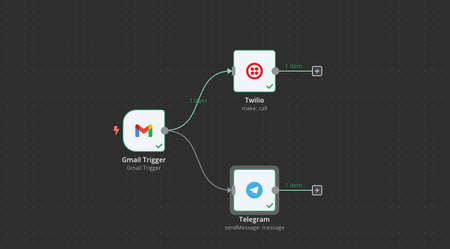Docker Compose for n8n Automation
Introduction
This guide will show you how to use Docker Compose to run n8n in a containerized environment.
Wait, what is n8n?
n8n is a free zapier alternative.
What is Zapier? Zapier is a tool that allows you to connect apps you use every day to automate tasks and save time.
For example you want to get a call whenever you get a new email from a particular email address.
Zapier allow you to do that - but it's not free.
n8n is free - but with a catch. You need to host it yourself.
Today we will see how to host n8n using Docker Compose.
Prerequisites
- Docker
- Docker Compose
Step 1: Create a Docker Compose file
Create a new file called docker-compose.yml and add the following content. Don't worry about what it does, we will explain it later.
version: '3'
version: '3.8'
services:
n8n:
image: n8nio/n8n
ports:
- "5678:5678"
environment:
- N8N_BASIC_AUTH_ACTIVE=true
- N8N_BASIC_AUTH_USER=user
- N8N_BASIC_AUTH_PASSWORD=password
- DB_TYPE=postgresdb
- DB_POSTGRESDB_HOST=db
- DB_POSTGRESDB_PORT=5432
- DB_POSTGRESDB_DATABASE=n8n
- DB_POSTGRESDB_USER=n8n
- DB_POSTGRESDB_PASSWORD=n8n
- NODE_FUNCTION_ALLOW_EXTERNAL=axios,qs
depends_on:
- db
restart: unless-stopped
db:
image: postgres:12
volumes:
- db-data:/var/lib/postgresql/data
environment:
- POSTGRES_USER=n8n
- POSTGRES_PASSWORD=n8n
- POSTGRES_DB=n8n
restart: unless-stopped
volumes:
db-data:This file defines two services: n8n and db. The n8n service runs the n8n container, and the db service runs a PostgreSQL database.
Step 2: Start n8n
Run the following command to start n8n:
docker-compose up -dThis command will start the n8n and PostgreSQL containers in the background.
Let's analyze the docker-compose.yml file:
- The
n8nservice is based on then8nio/n8nimage. It exposes port5678and sets the environment variables for basic authentication and database configuration. - The
dbservice is based on thepostgres:12image. It creates a volume to persist the database data and sets the environment variables for the database user, password, and database name. - The
depends_ondirective ensures that thedbservice starts before then8nservice. - The
restartdirective ensures that the containers are restarted unless stopped. - The
volumesdirective creates a volume for the database data.
One interesting line is:
- NODE_FUNCTION_ALLOW_EXTERNAL=axios,qsThis is an optional environment variable that allows n8n to use the axios and qs libraries in Function nodes.
Let's say you need to make some external API call's using axios. You don't have that available by default in n8n. You can add it to the NODE_FUNCTION_ALLOW_EXTERNAL environment variable.
Step 3: Access n8n
Open your web browser and go to http://localhost:5678. You will be prompted to create a new account. This will be your default account.

You can create any customized automation now!
Conclusion
That's it! Now you have n8n running in a containerized environment using Docker Compose.
You can deploy it in any environment that supports Docker, such as your local machine, a virtual machine, or a cloud provider.

